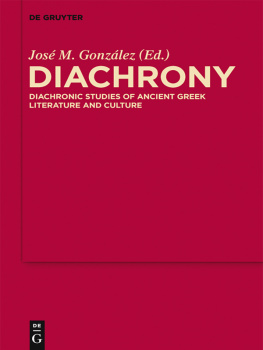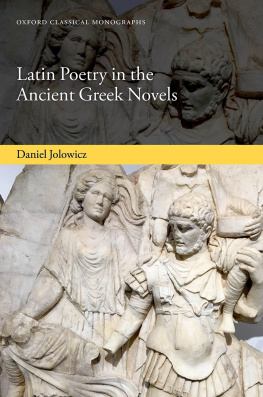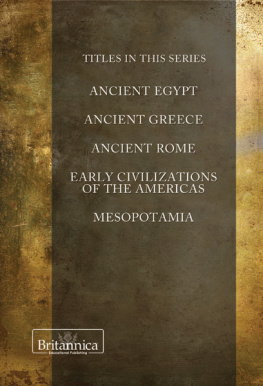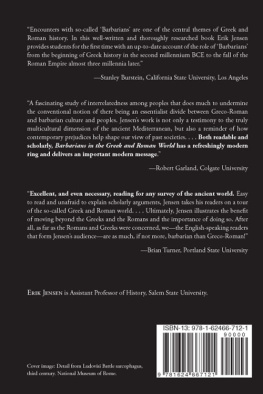A
CLASSICAL PRIMER
Dan Crompton studied Classics and Linguistics at Cambridge University and lives in London. He wishes someone had given him this book when he was a student.
He has also published A Funny Thing Happened on the Way to the Forum (2010), a translation of the oldest joke book in the world.

First published in Great Britain in 2012 by
Michael OMara Books Limited
9 Lion Yard
Tremadoc Road
London SW4 7NQ
Copyright Michael OMara Books Limited 2012
Illustrations copyright Aubrey Smith 2012
(aubreyboxterrapin@gmail.com)
All rights reserved. You may not copy, store, distribute, transmit, reproduce or otherwise make available this publication (or any part of it) in any form, or by any means (electronic, digital, optical, mechanical, photocopying, recording or otherwise), without the prior written permission of the publisher. Any person who does any unauthorized act in relation to this publication may be liable to criminal prosecution and civil claims for damages.
A CIP catalogue record for this book is available from the British Library.
ISBN: 978-1-84317-880-4 in hardback print format
ISBN: 978-1-84317-898-9 in EPub format
ISBN: 978-1-84317-897-2 in Mobipocket format
Designed and typeset by www.glensaville.com
www.mombooks.com
I NTRODUCTION
For a few people, the mere mention of Classics will trigger monochrome memories of facing the blackboard with books on their heads for posture, chanting out meaningless conjugations of amo, amas, amat in unison. For the vast majority, however, there will be no such associations, and Classics will merely be that subject that was studied at posh schools that look like Hogwarts.
To save you looking it up, let us say briefly that Classics is the study of the culture of the Ancient Greeks and Romans, and takes in all aspects of their life and learning from the languages to their literature, philosophy, art, history, sciences, politics, religion and all sorts. Through their texts, buildings and monuments, both civilizations have left us (literally) heaps of information about how they lived. But the real fascination in the subject doesnt come just from being immersed in their lives, but also by realizing just how many aspects of our own daily life have been directly influenced by theirs.
Everyone knows that the Romans built roads. But we can also thank both empires for bringing us central heating, concrete, the twelve-month calendar, plumbing, heated swimming pools, cranes and most crucially pizza. Thats not to mention the cultural benefits such as laws, a welfare system, philosophy and language. And, without ancient mythology and literature, Shakespeare would barely have strung a sentence together.
The Greek empire at one point stretched as far east as India, and the Romans once had control over most of Europe, the Near East and northern Africa. The Greeks made sense of the stars, figured out , gave us a2+b2=c2, and even managed to work out the circumference of the Earth. It took the rest of the planet centuries to emulate any of these achievements (Columbus did not confirm that the Greeks had been quite right about the Earths being round till 1,700 years later), and there is no doubt that our world without these Greek and Roman influences would be a very different place.
Back in the good old days of the last century (I hasten to add this is several decades before I was born), having a sound Classical education was deemed a jolly good thing. In the face of its rapid demise, this book is intended to give anyone who has an interest in knowing about the basis of our own culture an insight into the key influences we can thank the Greeks and Romans for.
Any reciting of amo, amas, amat will be entirely voluntary.
D AN C ROMPTON
C HAPTER 1
G REEK AND L ATIN L ANGUAGES
T HE G REEK LANGUAGE : FROM A LPHA TO O MEGA
Ancient Greek is not an easy language to master. However, its influence over so much of our language today means that it deserves a few moments to pick up the basics at the very least so that you might be able to recognize the difference between a and an on your next holiday.
HISTORY
The oldest surviving form of Ancient Greek is Mycenaean Greek, which used an alphabet now known as Linear B from as early as 1600 BC . Scholars spent years trying to decipher Linear B from remnants unearthed in Crete, Mycenae and elsewhere, and it wasnt until 1952 that its syllabic letters were finally cracked.
The current Greek alphabet, derived from Phoenician, didnt appear for another 800 years or so, in about 800 to 700 BC . (The Phoenicians were an ancient civilization based around the eastern Mediterranean and beyond, who had important trading and cultural influences across the whole region from around this time. Whole books could be written on them and indeed have been but we really must crack on.) The mountainous mainland and the isolation of the countrys islands meant that many dialects of the language were able to exist side by side for many centuries, until a common Greek (Koine Greek) was settled on in the fourth century BC . This was probably as a result of Alexander the Greats incredible expansion of the Greek empire during this time (all the way to India), which required tens of thousands of soldiers to come together and be coherently governed with one common language.
THE ALPHABET
Youll be pleased to hear that it wont take decades of research to pick up the basics of the alphabet, though, and well have you reading simple words in no time. In these examples, youll see how many of the words we use today are derived from Ancient Greek words or, in some cases, straightforward transliterations of the original word.
There will be no vocabulary test at the end.


NOT AN IOTA OF DIFFERENCE
On top of these twenty-four characters, there is a whole heap of accents called diacritics. They began to be seen in texts from about 400 BC onwards in answer to some of the ambiguities in the language. They can appear on any of the seven vowels in the alphabet and are used to denote either tone of the vowel or stress on the syllable.
Luckily for modern Greeks, the tonal diacritics were officially scrapped in 1982 (probably for being far too confusing). Unfortunately for students of Ancient Greek, we need to know the difference between the letter with no diacritic, and one with an iota subscript (). And the less we say about the differences between and , the better. In fact, the letter on its own can have about six different meanings, dependent on the placement or not of the various diacritics.
The only diacritic that perhaps you should pay attention to is the aspiration, which is almost like a very small c-shape that can be placed over any of the vowels and also over a Rho as in (rh), (ha) or (he). The aspiration gives any letter a breathing h sound, which doesnt exist as a letter in Greek in its own right. This gives us the silent h in many English words that are derived from Greek, such as rhythm. For simplicity, I have left out all diacritics from this book except for the aspiration.
A QUICK TRIP TO HONOLULU
Way back in the twentieth century, an American linguist discovered something truly staggering in the Greek language: when comparing some of the languages basic words, he found remarkable similarities with similar words in the Hawaiian language.
Next page









![Michael Lovano - The World of Ancient Greece: A Daily Life Encyclopedia [2 Volumes]](/uploads/posts/book/268736/thumbs/michael-lovano-the-world-of-ancient-greece-a.jpg)







